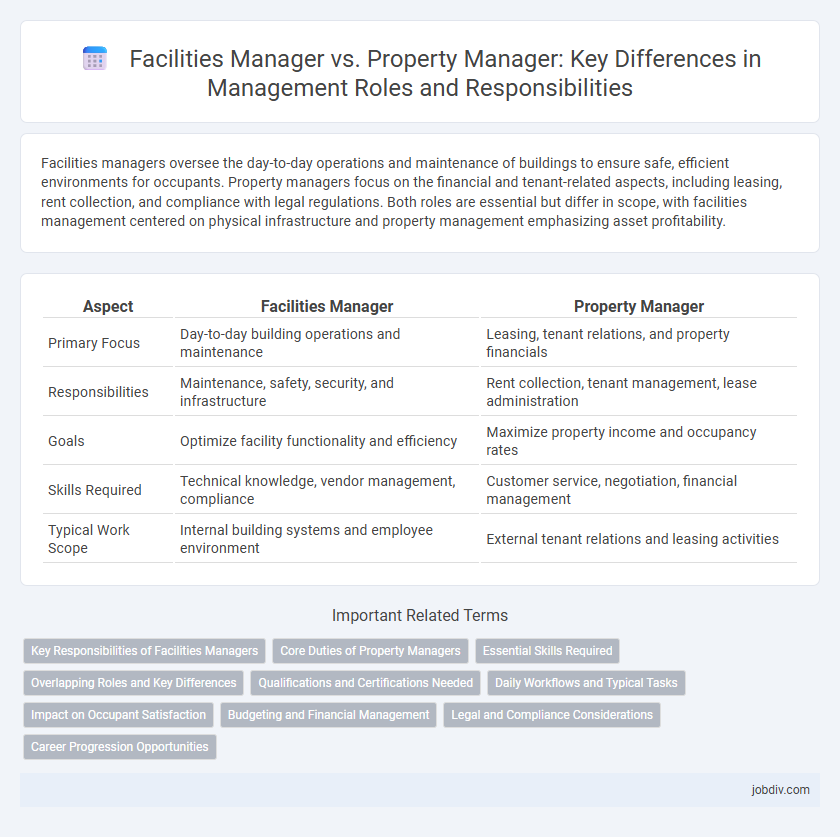Facilities managers oversee the day-to-day operations and maintenance of buildings to ensure safe, efficient environments for occupants. Property managers focus on the financial and tenant-related aspects, including leasing, rent collection, and compliance with legal regulations. Both roles are essential but differ in scope, with facilities management centered on physical infrastructure and property management emphasizing asset profitability.
Table of Comparison
| Aspect | Facilities Manager | Property Manager |
|---|---|---|
| Primary Focus | Day-to-day building operations and maintenance | Leasing, tenant relations, and property financials |
| Responsibilities | Maintenance, safety, security, and infrastructure | Rent collection, tenant management, lease administration |
| Goals | Optimize facility functionality and efficiency | Maximize property income and occupancy rates |
| Skills Required | Technical knowledge, vendor management, compliance | Customer service, negotiation, financial management |
| Typical Work Scope | Internal building systems and employee environment | External tenant relations and leasing activities |
Key Responsibilities of Facilities Managers
Facilities managers oversee the operational efficiency of buildings, focusing on maintenance, safety compliance, and space management to ensure optimal working conditions. They coordinate building services such as HVAC, cleaning, and security while managing vendor contracts and budgets. Unlike property managers who handle leasing and tenant relations, facilities managers prioritize infrastructure integrity and daily facility operations.
Core Duties of Property Managers
Property managers oversee the daily operations, tenant relations, rent collection, and maintenance coordination for residential, commercial, or industrial properties. They ensure compliance with landlord-tenant laws, prepare lease agreements, and handle property marketing to minimize vacancies. Effective property management maximizes property value and generates steady rental income while addressing tenant needs promptly.
Essential Skills Required
Facilities Managers require expertise in building systems, maintenance coordination, and safety compliance to ensure operational efficiency. Property Managers must excel in tenant relations, lease administration, and financial oversight to maximize property value. Both roles demand strong communication, problem-solving, and organizational skills to effectively manage assets and support business objectives.
Overlapping Roles and Key Differences
Facilities managers oversee the operational functionality, maintenance, and safety of buildings and infrastructure, ensuring that all systems, such as HVAC, electrical, and cleaning services, run smoothly. Property managers focus on tenant relations, leasing, rent collection, and financial performance of real estate assets. Overlapping roles include coordinating maintenance services and handling vendor contracts, but facilities managers emphasize day-to-day operations while property managers concentrate on asset management and revenue optimization.
Qualifications and Certifications Needed
Facilities Managers typically require certifications such as Certified Facility Manager (CFM) and knowledge of health and safety regulations, emphasizing operational efficiency and maintenance expertise. Property Managers often hold credentials like Certified Property Manager (CPM) and Accredited Residential Manager (ARM), highlighting skills in real estate management, leasing, and tenant relations. Both roles benefit from project management experience, but Facilities Managers focus more on technical maintenance, while Property Managers specialize in financial and tenant-focused certifications.
Daily Workflows and Typical Tasks
Facilities Managers oversee the maintenance, safety, and operational efficiency of building systems, including HVAC, electrical, and janitorial services, ensuring compliance with health and safety standards. Property Managers handle tenant relations, rent collection, lease administration, and coordination of property marketing and leasing activities to maximize occupancy and revenue. Daily workflows for Facilities Managers emphasize preventative maintenance and rapid response to infrastructure issues, while Property Managers focus on tenant communication and financial reporting.
Impact on Occupant Satisfaction
Facilities managers directly influence occupant satisfaction by ensuring optimal maintenance, safety, and functionality of building systems, which enhances comfort and productivity. Property managers impact satisfaction through effective tenant relations, rent management, and addressing lease-related concerns, fostering a positive rental experience. Both roles are critical, but facilities management plays a more immediate role in the daily environmental quality experienced by occupants.
Budgeting and Financial Management
Facilities managers optimize operational budgets by focusing on maintenance, repairs, and utility costs to ensure efficient building performance. Property managers oversee broader financial responsibilities, including rent collection, lease management, and expense allocations to maximize property profitability. Both roles require detailed financial planning and monitoring but target different aspects of asset value and operational expenditure.
Legal and Compliance Considerations
Facilities managers oversee the operational compliance of buildings, ensuring adherence to health and safety regulations, fire codes, and accessibility standards, while property managers focus on legal matters related to leases, tenant rights, and property law. Facilities management requires knowledge of workplace safety regulations such as OSHA and local building codes, whereas property management demands expertise in landlord-tenant laws and fair housing regulations. Both roles must maintain accurate documentation to comply with audits and legal inspections, but their primary legal responsibilities differ based on operational versus tenancy compliance.
Career Progression Opportunities
Facilities Managers often advance by specializing in areas like sustainability or security systems integration, leveraging technical expertise to lead complex infrastructure projects. Property Managers typically progress by acquiring portfolio management skills, overseeing larger residential or commercial assets to enhance tenant relations and financial performance. Both career paths offer leadership roles, but Facilities Managers tend to move towards operational efficiency and compliance, whereas Property Managers focus on strategic asset growth and investment returns.
Facilities Manager vs Property Manager Infographic

 jobdiv.com
jobdiv.com